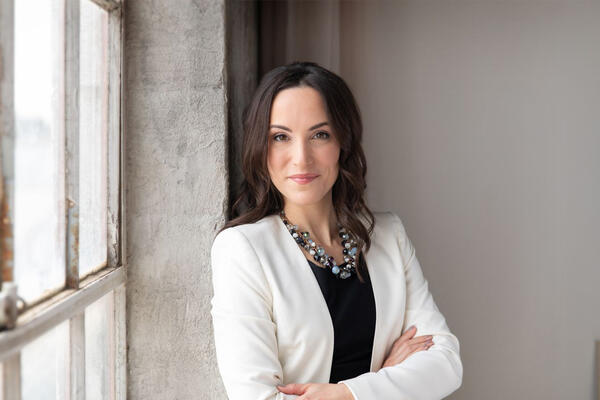
The gift of sight
Anne-Marie and Heinz Brune’s legacy gift will help fight devastating eye and brain diseases

Anne-Marie and Heinz Brune’s legacy gift will help fight devastating eye and brain diseases
By Beth Bohnert Office of AdvancementMacular degeneration robbed Anne-Marie Brune of her sight. But because of a gift that she and her husband Heinz made to Waterloo, other people with the same condition may recover their vision.
The Brunes believed in the power of science to transform lives touched by disease, and they dedicated their entire estate to research that will “advance the human condition.” Their gift to Waterloo’s School of Optometry & Vision Science will further that goal by supporting research in eye and brain diseases that afflict thousands of people around the world.
 Anne-Marie and Heinz were hard-working German immigrants who came to Canada in the mid-1950s. In time, thanks to Heinz’s engineering talents and Anne-Marie’s skills in accounting, they built a thriving business, Hamilton Thermal Specialties, which designed and manufactured industrial heat-treating equipment. Although they never had children, they developed a wide circle of friends and travelled extensively.
Anne-Marie and Heinz were hard-working German immigrants who came to Canada in the mid-1950s. In time, thanks to Heinz’s engineering talents and Anne-Marie’s skills in accounting, they built a thriving business, Hamilton Thermal Specialties, which designed and manufactured industrial heat-treating equipment. Although they never had children, they developed a wide circle of friends and travelled extensively.
In the last years of their lives, the couple struggled with health issues. Heinz developed Alzheimer’s disease and passed away in 2018. Anne-Marie battled age-related macular degeneration (AMD), a debilitating disease that would eventually steal her sight.
Seeking treatment, Anne-Marie became a patient at the School’s Centre for Sight Enhancement, where she received support to help her cope with her diminishing vision.
Anne-Marie died in June 2019 at the age of 95, but her and Heinz's wills demonstrated that they never forgot the care she received at Waterloo. And now, through their bequest, they are caring for others who suffer from the conditions that affected them both.
The Brunes’ gift will help to develop the School’s Ocular Imaging Research Centre. Here, using the eye as a window to the brain, scientists will work to better understand, detect and treat age-related diseases like Alzheimer’s and AMD.
Our eyes and brain are linked by the optic nerve and problems in one organ are often reflected in the other. For example, Waterloo researchers have found that some neurodegenerative diseases create changes in the retina, a discovery that could allow us to identify conditions like Alzheimer’s far earlier than we can now.
Another group of Waterloo scientists is exploring the possibility of enhancing the brain’s ability to process residual visual information. With training, it’s possible that people with AMD may be able to recover enough vision to be able to read.
As the global population ages, the potential impact of this kind of research is enormous. It’s estimated that age-related macular degeneration, the leading cause of legal blindness in the developed world, will affect 288 million people by 2040. And in Canada alone, 30,000 new cases of Alzheimer’s and Parkinson’s appear every year.
“Work conducted at the Ocular Imaging Research Centre will enable early detection and monitoring of the most debilitating and prevalent eye and brain diseases society faces,” says Ben Thompson, one of Waterloo’s leading vision scientists.
“In the longer term, new retinal imaging techniques developed at the Centre will enable the development of new treatments and improve patients’ access to care.”
Despite the sadness of their final years, Anne-Marie and Heinz Brune lived long lives. Thanks to their generosity, thousands of other people may now have the chance to do the same.

Read more
The faculties of Science and Arts introduce a new theatre and performance course tailored to Science students

Read more
Pharmacy alum Stacey D'Angelo boosts patient health by deprescribing meds, focusing on holistic health, mental well-being and personalized medicine

Read more
Discover the science behind a solar eclipse in preparation for the once-in-a-lifetime occurrence on April 8
The University of Waterloo acknowledges that much of our work takes place on the traditional territory of the Neutral, Anishinaabeg and Haudenosaunee peoples. Our main campus is situated on the Haldimand Tract, the land granted to the Six Nations that includes six miles on each side of the Grand River. Our active work toward reconciliation takes place across our campuses through research, learning, teaching, and community building, and is co-ordinated within the Office of Indigenous Relations.